
How to teach your child responsibility
Parents spend a lot of energy trying to give their children the best of everything. Sometimes they feel that there is danger at every turn. So they make every effort to protect their kids. However, excessive love and care often prevent them from developing independence, responsibility, and leadership skills.
If a child has never fallen and scraped his knee, how would he learn that actions have consequences? Therefore, parents need to know how to teach their children to be responsible. Even if kids are very small now, someday they will grow up and face real problems.
What is responsibility?
For any adult person, responsibility is considered a strictly obligatory quality. But what does it really mean to be responsible? What do we do with it?
Responsibility is the ability to fulfill obligations and follow society’s rules and understand the consequences of one’s influence on the world. According to an Austrian psychologist and philosopher, Viktor Frankl, responsibility is something that life itself places in front of us, and many of us seek to avoid. It is scary as a deep abyss but at the same time majestic.
Our future and that of others depend entirely on us. After all, every second, we make choices and decisions or, conversely, miss an opportunity that is given. These choices determine our behavior and also the behavior and attitude of others toward us.
In general, being responsible means:
- Taking responsibility for your life. In every single situation, we have a thousand choices and possibilities. But these choices are ours, not anyone else’s. In the end, we learn to make better decisions the next time.
- Not shifting responsibility to others or external circumstances. Many people often blame their failures on their unhappy childhood or psychological trauma, etc. We need to take the position of an adult who is responsible for everything in his life himself.
- Being honest. We should tend to tell the truth and keep our promises. This way, the surrounding people will believe us and think that we are trustful.
- Being more honest to ourselves. It is important to become aware of the benefits of irresponsibility. Many people do not realize that they benefit from remaining children on the inside, being sick, or avoiding something. They want attention, sympathy, and support.
- Keeping the balance. When we deal with others, we share the responsibility. Any relationship — business, personal, etc. — must be equal. It means that each of us has our responsibilities, and we only respond for our side and don’t get onto other people’s territory.
- Distinguishing responsibility from guilt. We often take responsibility for things we cannot control, feeling guilty in certain situations. It makes us angry, and we may feel despair.
- Being appreciative. Life ends one day, and we should appreciate every moment of it and base our choices on this understanding. Some choices lift us; others bring us down.
- Being independent. We must learn to act and make our own decisions, regardless of whether those around us approve of them. Being responsible means being free.
- Having financial awareness. Even though it is a separate topic, it is well-connected to the concept of responsibility. Financial responsibility equals financial freedom, which is not having so much money to be able to buy whatever we want. It is when you are not living from paycheck to paycheck; do not blame yourself or anybody for not earning enough; have savings instead of debts.
Why do kids need to learn about responsibility?
Taking responsibility for your actions is part of the process of becoming a healthy adult. A sense of responsibility helps you achieve your goals in any area of life. Responsibility allows you to create your values and take the reins of your life into your own hands. It makes you a leader.
And a true leader is an independent person who is used to achieving everything himself. The roots of this lie precisely in upbringing. That is why responsibility is taught from childhood — both in the family and at school.
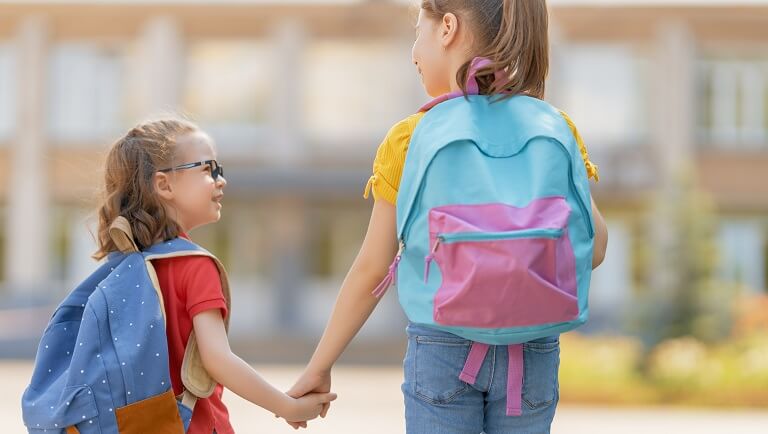
If you ask your child what it means to be responsible, he or she will respond something like: “do well”, “do whatever Mom and Dad say”, or “always do your homework”. Often adults use the term “responsibility” to explain to children that they should accept the rules, behave well and do what their parents tell them. Do you think that maybe responsibility is a little more than these obligations?
Freedom of action is something that many children lack. Traditionally we believe that a child is a fragile creature that is not independent and needs all-around care. In the early years, it is obviously so. However, as he grows up, he needs to act more independently. If this need is not satisfied, it will be replaced by complete dependence on others, especially parents. The “mother’s boy/girl” will not grow up as a leader because he/she is used to obeying.
Children who are not accustomed to independence are afraid to act independently. When they try to do it, it comes out awkwardly and usually unsuccessfully. So quickly become disillusioned with “adult” life.
But it is not only about leadership. To be responsible is our public duty. Everyone wants his/her partner to be responsible, parents and teachers to be responsible and take care of children, professionals to do their work responsibly because the presence of such people around gives us a sense of security, trust, and stability.
Though, there is nothing wrong with the fact that a child or an adolescent can be infantile in their actions and tend to blame others for their mistakes. They still subconsciously feel that parents are responsible for everything. It happens because their picture of the world is incomplete. They lack experience and cannot fully grasp the depth of the word “responsibility”. Not always they can trace the cause-and-effect relationship between an act or event and its consequences.
The good news is that responsibility is not part of a character. It is a value that a kid can acquire with the help of adults.
How to teach responsibility to kids and what can go wrong
Teaching a child responsibility will require a great deal of time and effort from the parent. It is important to understand that and be ready. It will not happen overnight. Mostly you will need to reinforce the emerging sense of responsibility, talk about it with your child as he gets older, and use your own life experiences as examples.
Explain to your child the positive and negative consequences
You can start by using as an example when something happens in your life or your child’s life. Reinforce the positives moments like: “You got a good grade because you studied hard” and explain the negative ones: “Your shoes and feet are all wet because you were jumping in puddles”.
To teach him to see the connection between cause and effect, ask your child to think about different situations and tell you what would happen if he did or did not a certain thing. For example, what would happen if he forgot to set the alarm clock for his school?
Let a child be more independent
A kid must spend enough time outside his home and even away from his parents. Kindergarten, a playground, playing with kids from the block — in all these circumstances, the child faces an unfamiliar society and environment in which he has to learn to navigate. Whether these interactions are going to be successful or not depends only on his actions.
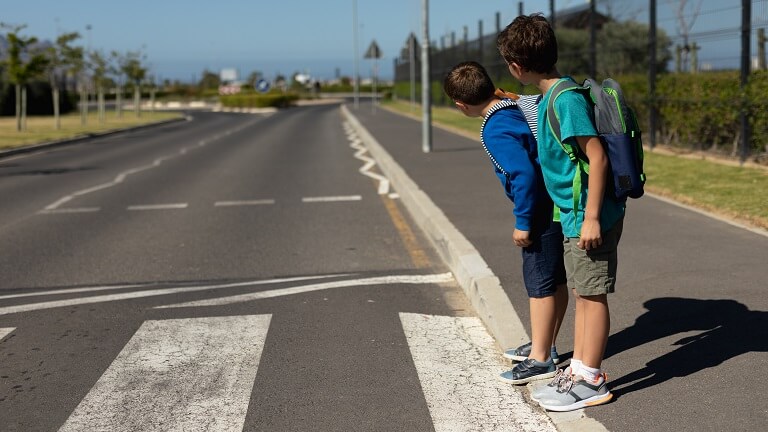
Furthermore, it is necessary to change his usual environment from time to time: a transfer to another kindergarten, taking him to another park or playground. When a kid gets used to the same environment, the ability to act independently decreases.
Over time, when the playground and kindergarten are replaced by the school, sports clubs, or creative after-school clubs, you should consult with the child and encourage him to choose what he wants without the help of other relatives or older siblings. You can even ask him to organize it on his own: decide on how and when to go there, etc.
Provide your kid with the tools he needs to be responsible
Make it easy for your child to take more responsibility for his life and give him the tools necessary for self-discipline. If you want your kid to wake up on time, give him an alarm clock. If you want him to have a neat and organized desk, make sure he has containers for office supplies, holders, folders, etc. In case you want him to be more self-organized, provide him with an agenda and show him how to use it.
Give your child the opportunity to be responsible
Give your child a list of chores to do around the house. This way, he can choose tasks for himself and think about how to do them properly. Explain well what kind of work you have prepared and how the job should be done, and the consequences of not doing it properly. In the end, delicately give your evaluation of the result.
Let your child help you
Make your kid feel that he is valuable and tell him that he can do a lot to help you. That will boost his self-esteem and make him more prone to help. By turning responsibility into a fun team effort, you help your child get the hang of it faster. You are also teaching him to take care of himself.
If your teenager is good at navigating the web, let him find bargain airline tickets for the family vacation. Or send him to the store to buy something for dinner without a specific list. So he can take whatever he wants and figures what he can make out of it.
Do not hurry with offering your help
Often when we realize that the kid is making the wrong decision, we are tempted to step in and tell him what to do or even solve the situation ourselves. Allow your kid to make mistakes. And try not to “glue the pieces together” for your child when he is dealing with the consequences of his bad decision. Otherwise, he can never understand the connection between actions and their consequences.
For example, your kid refuses to eat what you made for dinner and wants something else even though you had agreed on this. You can tell him that is all you have, and if he doesn’t eat, you put the plate in the fridge. If he starts complaining about being hungry later at night, you can tell him that his food is in the refrigerator. If he refuses again, he will remain hungry for the rest of the night — these are the consequences of his bad behavior.
Impose sanctions for irresponsible behavior
In the real world, there are always legal consequences for your misbehavior. Responsibility involves enforcement action against violators. Your kid needs to get familiar with this facet of responsibility as well.
Remember that sanctions are not punishment. Let’s look at an example. You give your kid some money to go to the supermarket, but instead, he spends them on something else. If you just scold him, it will probably not have the desired effect.
The kid should understand that irresponsibility destroys agreements and trust. If the parents lose the trust which his relationships with them are built on, the structure will break. There will be fewer responsibilities, but there will also be fewer rights.
Don’t confuse responsibility with obedience
If a kid does something under the guidance of an adult, this is not yet a responsibility. It is obedience. An obedient child can perform perfectly at school and do all the tasks with enthusiasm and pride. On the other hand, a responsible child will create a plan that will help him deliver everything on time. The first one just follows the instructions, the second one thinks about the consequences. Responsible children strive to get real knowledge and are willing to take responsibility for both good and bad grades.
Don’t compare your teenager to anyone
It may seem like good motivation, but in reality, comparisons hurt. It is cruel and unthoughtful to compare a kid to other children or even to yourself at his age. How can you demand anything from an individual who has no relevant experience?
Moreover, every child has a unique personality and capabilities that can take time to manifest. And if “your friend’s son” is getting ready to school by himself in first grade, it may not necessarily be true that your child is ready for it too.
Introduce your kid to the concept of money-spending
Every kid needs to learn how to manage expenses. The financial upbringing that parents give their child will largely determine his material independence and well-being in adulthood. Many parents do not like taking their kids to the supermarket as it has the same scenario: the kid sees a new toy or a strategically exposed pack of sweets and starts begging to buy them for him. You try to talk him out of it, but he starts crying.
First, always make a list of all the child’s expenses you are willing to spend on during a month. You can create a separate category in your budget. Before going to the store, explain that you only have a limited amount of money, and he can only choose something that does not exceed it. Always go to the supermarket with a shopping list and stand your ground even if he starts asking to buy something else instead of what he has chosen before. This is how he will realize that going to the store has a purpose and not just to buy something pleasant.
Now, what about the pocket money? Their main function is not to control your child what to do with it. It is to let him experience what it is like not to have enough money, decide for himself whether he needs to save or not, and how much to spend on his desires. Make sure to explain to him that from now on he can buy what he wants, and you will only buy him things he needs and gifts for the holidays.
What age-appropriate tasks can you give to you kid?
It is important not to overdo with tasks you assign. Give your kid age-appropriate responsibilities that he/she can handle.
Preschool children (ages 3−6)
The preschool age is the best time for the formation of independence and responsibility. At the age of 3−3,5, the boundaries of desirable and condemned behavior are usually delineated. In a way, it is a crisis period when a kid can seem absolutely irresponsible. So the clearer you delineate the boundaries, the more references the child will have when he tries to figure out which behavior is considered responsible and which is not.
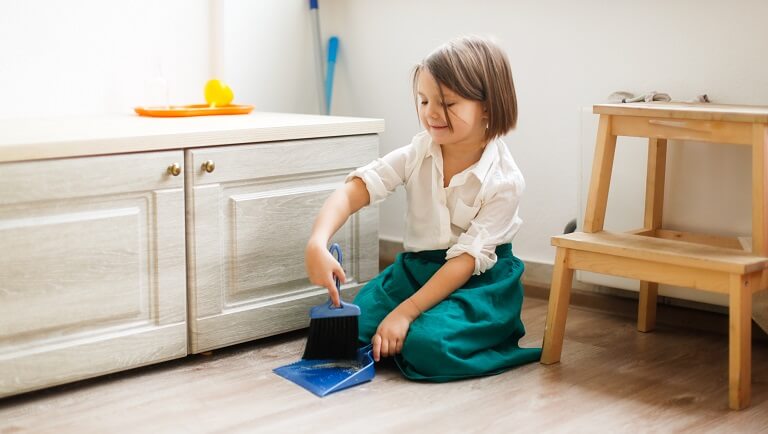
Preschool children want so much to be “like adults”, so they take on any “adult” task assigned to them with enthusiasm. The more you entrust your child with little responsibilities, the more responsible he grows. These tasks can include:
- cleaning up toys,
- making bed,
- washing the boots after the rainy day or walk in the mud,
- watering the flowers,
- helping unload shopping bags,
- rinsing dishes or even vacuuming his/her room,
- deciding on what to have for dinner and how much,
- picking what to wear (with your guidance so to choose weather-appropriate clothes),
- deciding on how to arrange things in his/her room and who is allowed there,
- deciding on whom and what to play with,
- getting pocket money or small contributions for something well done (from the age of 5). During this period,
- kids are just getting acquainted with money but still not fully understanding that they come with responsibility and do not exist just for fun.
Even if a kid does not manage to do the task perfectly, thank him for his desire to help. If you see that you will have to redo something for him, it may be better not to do it in front of him. Otherwise, his self-confidence and motivation to participate in family matters will crack, and next time it will be difficult to get him to help around the house.
School children ages 7−10
Starting from 6−7 years old, kids become aware of what behavior will be approved and disapproved of. At this age, children learn to evaluate actions not only by consequences they entail but also by the internal motives of the person committing those actions.
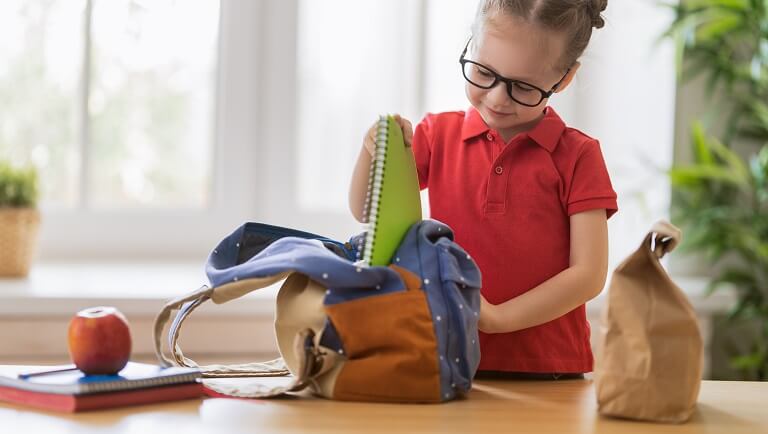
At this age, you need to expand the list of tasks for which the child will be personally responsible. This may include:
- doing homework lessons and picking the time to do it;
- packing up a backpack for school;
- feeding and walking family pet;
- being in charge of bread in the house: checking if there is any at home and buying it if necessary.
Also, they should be free to decide:
- what to do in their spare time,
- which sports they want to do or hobbies to explore,
- how they want to wear or have their hair cut.
Even though initially you will need to remind the kid of his assigned duties. But over time, he/she should learn to do this without your reminders. What you can do is to hang on the fridge or magnetic board in the child’s room a list of his duties, where each word is written in large and bright letters.
A child at the age of 7−12 should have the opportunity to have some income. Usually, at this age, the desire to earn some money is quite strong. To avoid problems in the future, it is better to give him money to do jobs that are not part of his direct responsibilities — for example, cleaning the whole house or the car, helping out at the parents’ work, or looking after younger siblings. Also, parents should start to motivate children to divide money into parts: for example, for everyday expenses, for saving and for gifts.
School children age 11−14
Children at the age of 11−14 can independently decide on many aspects of their daily life and be in charge of many things. Such as:
- taking care of their body, self-grooming;
- waking up by themselves when they need to go somewhere: a school or a piano lesson;
- finding their style in clothes;
- moving around the neighborhood by themselves;
- taking public transport to school alone;
- spending time with their friends: going to movies or a park;
- managing their finances and taking summer jobs, working as babysitters to earn extra money.
Though, during the adolescence phase, it is important to instill independence and reliability, and commitment. These qualities affect the future of children and their relations with society. It is parents’ social duty to grow a responsible individual.
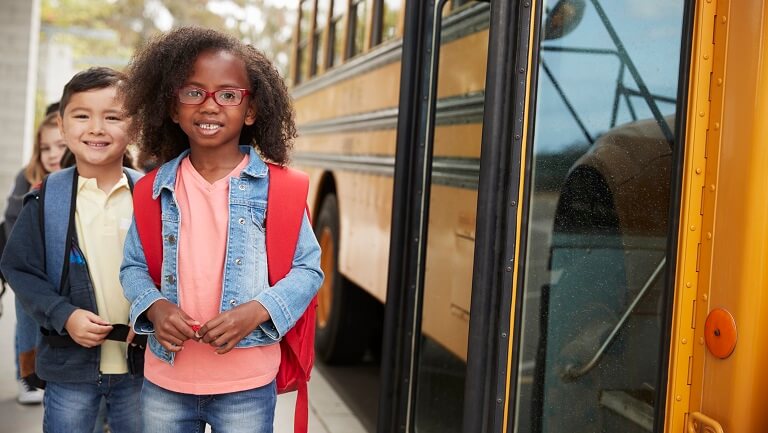
So be a role model. Show him/her the options for solving the problem. Often a teenager hides from responsibility simply because he has no idea how to approach the problem. Ask him about his plans and how he thinks to achieve his goals. Gently offer to help where he can not do it alone.
Include the teenager in family matters and also difficulties. At this age, kids are also ready to participate in family budget planning. They are well acquainted with the main expense and have an idea about the basic family needs. This is the right time to further introduce him to finance, for example, by enrolling him in a financial literacy course for children.
Responsibility can be a difficult concept for children to understand. But to be responsible means to be an adult, calculate your actions two steps ahead, take care of yourself and others. And it is parents’ duty to bring to the world an independent person, a model citizen who is honest and not afraid to take responsibility for his/her actions.

new engaging articles

